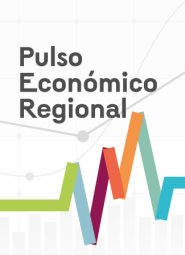Minutes for Banco de la República's Board of Directors Meeting on April 30, 2021
After a thorough evaluation of the most recent indicators of economic activity, inflation and international financial conditions, Banco de la República's board of directors (BDBR) voted by a 6-1 majority to hold the benchmark interest rate at 1.75%, with one dissenting vote in favor of a 25-basis point reduction.
The monetary policy discussion centered on the following factors:
First-quarter economic activity maintained the positive trend observed since the second half of 2020 despite new mobility restrictions put in place in January and again at the end of March. As a result, the technical staff has revised its central GDP growth forecast for 2021 upward from 5.2% to 6.0%. However, additional COVID-19 outbreaks of unknown intensity and duration, as well as uncertain fiscal conditions, make it necessary to consider alternative risk scenarios that, should they materialize, would instead point to growth between 3.6% and 5.2%.
Total annual inflation and inflation excluding food and regulated items fell less than projected by the technical staff and market analysts, registering 1.51% and 0.94% through March, respectively. Changes in inflation are likely to continue to be affected by ample excess productive capacity, which should progressively reduce over time. Given the above, both the technical staff's inflation forecast and expected inflation based on analyst surveys appear to be in line with a convergence to the 3% target inflation rate in 2021 and 2022.
The total national unemployment rate in March was 14.2%, while the figure for Colombia's 13 largest cities was 16.8%. Colombia's national statistics agency (DANE) also reported an increase in monetary poverty of 6.8 percentage points from 2019 to 2020, rising to 42.5%. High unemployment and the increase in the poverty rate provide grounds for the current, historically low policy interest rate.
A highly expansionary fiscal policy in the United States suggests that international financial conditions may grow less favorable. While financing conditions currently remain loose, long-term interest rates have increased and the Colombian peso has sustained some depreciation pressures that, while common to a majority of Latin American countries, have been more accentuated than elsewhere in the region.
Initiating a gradual process of fiscal consolidation that addresses the effects of the pandemic on public debt (now estimated to be around 15% of GDP) will be necessary to ensure public sector access to financing sources at reasonable costs. Failing to successfully undertake such a process could significantly limit the space available for monetary policy to continue supporting recovery in economic activity and employment.
The members of the board who voted in favor of holding interest rates weighed the positive and negative signals from the economy without identifying a net trend in either direction that would justify a change in what they consider a sufficiently expansionary monetary policy stance. Economic performance in the first quarter was a notable positive considered by the group, as were forecasts for inflation and expected inflation that pointed to a convergence with the 3% target in 2021 and 2022.
Among the negative factors considered by the group were a recent worsening of the COVID-19 pandemic and high levels of uncertainty surrounding potential future waves of the virus. In response, the board members signaled the need to closely monitor any new information related to the pandemic and its potential effects on economic activity. They also underlined the risks that could result from a steepening of the yield curve on government debt, which could reduce international investors' appetite for emerging markets and make access to capital markets more difficult.
Some of the board members noted that the slow pace of economic activity was reflected in reduced demand for credit that, together with an increase in perceived risk, has led to an increased share of investments, particularly in public debt, among financial intermediaries' asset holdings. This represents an example of the displacement effect, associated with a deterioration in fiscal conditions.
All of the board members shared concern over the negative environment created by uncertainty surrounding the fiscal adjustment project, the failure of which could affect macroeconomic stability and investor confidence and slow economic recovery. They also warned that a failure to implement a fiscal adjustment could limit the space available for a counter-cyclical monetary policy.
The member of the board who voted in favor of a 25-basis point reduction concurred with many of the points mentioned above. However, this board member also underlined that a situation in which the fiscal deficit is significantly higher than the external deficit in the current account suggests significant excess in private savings, translating to low levels of investment and private consumption and thereby limiting the space for economic growth. The board member also noted that private sector credit levels have barely increased in the last year despite efforts to inject liquidity, and that this has come as private sector deposits have increased 15%. Given the above, the board member called for an additional loosening of monetary policy, alongside new measures to promote medium- and long-term financing.





























































